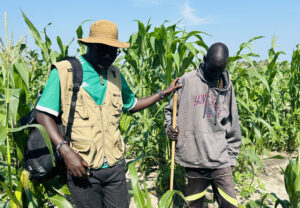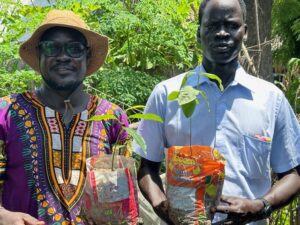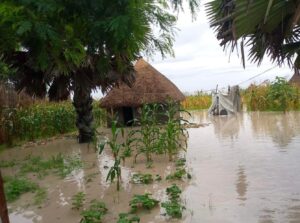In Leer, a small farming community facing the harsh realities of seasonal flooding, local farmer Yak Gai Lel has become a beacon of resilience and foresight.
Lel has long urged his fellow farmers to begin their cultivation early in the year as a strategy to protect their crops from the devastating floods that have become an annual challenge.
According to Lel, planting crops in May—well before the peak of the rainy season—allows them to mature by July, just before floodwaters intensify.
This approach has enabled him to preserve his harvests year after year, despite the increasingly unpredictable weather patterns.
In a recent interview, Lel shared his experience and the rationale behind his early planting strategy, stressing the critical importance of timing for a successful harvest.
“If we start early, we can harvest before the floods come,” he explained. Lel’s message to his fellow farmers is clear: by adopting this practice, they can secure their livelihoods and ensure food security for their families.
Lel emphasized that waiting for the ideal rainfall can be a mistake. “I don’t wait for the rain; once it comes in May, I start planting my crops,” he said.
He pointed out that some farmers miss the early rains, hoping for heavier downpours later in the season, but this often results in missed opportunities. “Where will I get rain alone? But it’s the same small rain that others refused to utilize. If you ignore the first rains in the summer, you will have no crops,” he warned.

Lel’s proactive approach has not only safeguarded his crops but has also inspired others in the community to rethink their planting schedules. His success serves as a powerful reminder of the importance of adaptation in the face of climate challenges.
However, Lel’s journey has not been without its difficulties. He has been working tirelessly, often on his own, to cultivate his land and produce enough food to support his family and those who work alongside him. Despite his success, Lel acknowledges the limitations of working alone and appeals for support from the government and other partners.
“I have been doing this work alone with the hope of showing people how to work independently and encouraging others to farm,” Lel said.
He highlighted the need for assistance, particularly in obtaining seeds and machinery that could help expand his garden and increase his output. “I sell my produce to support my family and those who work with me,” he added, underscoring the broader impact of his farming efforts on the community.
James C. Thech, a farmer and local primary teacher who mainly planting maize, groundnut and trees also narrated his testimonies. He says his plantation is mainly dependent on watering them and never stop during dry season.
Mr. Thech acknowledge the support his garden offer to provide food to his family and buy other basic needs for his three children who are in primary school.
“When I am not at home, I directed my wife to watering them every evening, this method the the crops and trees to grow faster and gain strength.

According to Thech, the difficulty part affects his work is marketplace to sell his produces as people tend to take the things for free.
“You know me and my son could take the items we want to sell with our hand to the market and people begin to beg us on the way because not everyone willing to pay money they want to take things for free which I refused. Sometimes it creates stereotype to my family being regarded as business home, but that doesn’t mind me.
Another vegetable Farmer, George Tut, showcase his produces saying he is well known of farming during the dry and rainy season. Tut, who is a wounded hero, have garden located near Gaar river in Leer County which cover a land of three fedan.
He narrated how he started to transit from army to farming. Mr, Tut said he has been farming since 2008 in Rubkona of Bentiu town, supplied the market with fresh fruits and many could visited his garden to get the vegetable with low cost.
He says his work have been lacking support, but he couldn’t give us since people branded him as “vegetable man” and encourage the government to empower local farmers with equipment which could boasted their work
Roda Nyakoach Diu, a farmer who turned vegetable vendor in Leer town explained the consequences flood cause to the farmers. She says several vegetables do not grow during the flooding the forced them to seek for alternative seeds which could be favorable to the land.
Nyakoach never give up, she continues to create a dyke to prevent her ventilatable farm so that things planted could get matured.
“I build a dyke surrounding my vegetable farm and I keep taking away the rainwater inside the garden until my crops get ready for harvest which is not easy. Government should support us with tools to help in mitigating floods,’ she narrated.
Agriculture Director in Leer County, Simon Liah Kuor acknowledged the resilience of farmer to bottle with floods which have been persist for over three years. He says his department lack capacity to support the farmers, but they are coordinating with NGOs and state government to provide the support including seeds which could be planting during the flooding period.

He said Maize and sorghum are not any options any longer could not resist water and recommended rice, sugarcane and yam as a new crop but raising concerned that community need to be trained on ways of planting such new crops since they are not traditional been existing in the area
The Famer’s call to action resonates more urgently than ever. With the right support, he believes that more farmers in Leer can adopt early planting techniques, reducing the impact of floods and enhancing the community’s resilience to climate change.

